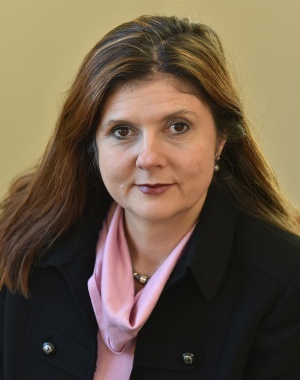
Ford School economists Betsey Stevenson and Justin Wolfers are called upon regularly to comment on breaking economic news and trends. In addition to their teaching and active research portfolios, they lend their expertise to news outlets around the world, offering clear and informed analysis on topics of general concern. With the recent flurry of news about inflation and recession fears, they’ve each been highly sought after.
Stevenson served as a member of the White House Council of Economic Advisers from 2013 to 2015, and as the chief economist of the U.S. Department of Labor from 2010 to 2011. Among other credentials, both Stevenson and Wolfers are research associates at the National Bureau of Economic Research.
In addition to teaching undergraduate and graduate-level economics courses, they jointly have created a podcast, “Think Like an Economist,” and published a popular series of economics textbooks – Principles of Economics, Principles of Macroeconomics, and Principles of Microeconomics. They have active twitter followings at @JustinWolfers and @BetseyStevenson.
Here is a compendium of their recent media appearances.
Stevenson
US markets sink on unexpectedly high inflation, BBC, September 13, 2022
"It's really good news that gas prices are coming down. it gives people a little bit more room in their budget, a little bit more breathing room and I think it also makes people feel a little bit better," she said.
But she added: "I don't think it speaks to being out of the woods". She expects inflation to remain higher than the US central bank's 2% inflation target even at the end of next year.
Stocks sink after inflation report shows unexpected price climb in August, The Washington Post, September 13, 2022
“We thought we’d see inflation start to come down, and instead what we’ve seen is inflation really sort of entrenched,” said Betsey Stevenson, professor of public policy and economics at the University of Michigan and a former member of the White House Council of Economic Advisers. “If there’s no real progress, then that says, ‘Does the Fed need to take stronger action?’ And if the Fed needs to take stronger action, what does that mean for the risk to peoples’ livelihoods?”
“We’re seeing services that aren’t housing, that aren’t energy services, that the inflation rate is picking up, and that worries people because that indicates higher entrenched inflation,” Stevenson said.
U.S. employers added 315,000 jobs in August, NPR, September 2, 2022
“The Fed's concern is that if people aren't coming into the labor force willing to take those jobs, that demand for workers is just going to create inflationary pressure. But if instead that demand for workers is drawing people back into the labor force, we'll be able to meet employers' demands for hiring without it creating additional inflationary pressure.”
August jobs report is ‘in the sweet spot’ for a ‘soft-landing’ economic recovery: Fmr. Labor Dept. Chief Economist, NBC News, September 2, 2022
“This jobs report is absolutely in the sweet spot, looking like a soft landing. And we are obviously going to need a lot more that look like this to really know that we’re going to achieve that soft landing. But what we saw was yeah, unemployment ticked up. That might be a little bit of pain, but actually behind that unemployment ticking up was nearly 800,000 people who entered the labor force last month. So all of these additional people are coming in, the labor market wasn’t able to absorb all of them but it absorbed a whole lot of them. And what we’ll hopefully see is that even more of them will get jobs again next month and even more people will come in. And what that means is that employers who have been desperate to hire are going to find that there are workers available for their jobs without having to offer the outsized wage gains that could spark further inflation in the service sector. That’s what the Fed has been worried about. They don’t want to see people lose their jobs. What they want to see is that employers are able to hire without sparking further inflation.”
Wolfers
If gas prices are falling, why aren’t things cheaper?, NPR Marketplace, September 14, 2022
“Gas prices are only one part of the puzzle. There’s a whole lot of other prices in the economy,” said Justin Wolfers, an economist at the University of Michigan. “We know that it’s really difficult to get goods around the world still. It took me a year to get the dishwasher that was just installed in my house last week.”
5 key takeaways on inflation from the August CPI report, Brookings Institution, September 14, 2022
“I don’t see inflation taking off,” said Justin Wolfers, nonresident senior fellow at Brookings and an economics professor at the University of Michigan. “It looks like it’s just sort of stuck where it is, but that’s very disappointing.” In response to the still-high price increases, Wolfers said if he were Fed chair he would raise interest rates by ¾ percentage point at next week’s Federal Open Market Committee meeting. Furthermore, where many people had thought the Fed might only raise rates at the December meeting by ¼ point, Wolfers said that may be changing in light of the latest CPI release. “To the extent that this [report] paints a story of inflation being stuck, if I still continue to believe that in a month’s time, then I’d want to be a little bit more aggressive,” he said.
Economist offers "counter-intuitive" advice on student loans, CNN, September 2, 2022
“Well I am heading to college and I’m talking to my students every day. And in fact, I tell them the opposite. I say, go ahead and borrow. And that might sound like counterintuitive advice from an economist, but here’s how I want you to think about it…Wouldn’t it be great if there was a way that we could move money from your future self, who’s got a lot of income, to your current self while you’re in college? There is – it’s called student loans. Go ahead and borrow and shift some money from that part of your life where you’re going to be wealthier to that part right now when you really need it."
Private payrolls grow less than expected, NPR Marketplace, August 31, 2022
“The way the government numbers are constructed is the government calls a whole bunch of companies and says, ‘What happened to employment last month?'” explained Justin Wolfers, a professor of economics at the University of Michigan.
'Both a warning and a threat': Economics professor decodes Fed chair's comments, CNN, August 29, 2022
“It’s both a warning and a threat. He’s trying to set the political ground to make sure that people understand that if inflation remains high, the economy will have to slow. He will be a big part of slowing the economy. And in reality, what does that mean for people’s pocketbooks? It means high interest rates lead to less spending, particularly fewer businesses expanding, fewer people buying houses, and industries like construction will get hit really hard. But for all of us, it means that corporations are going to hire fewer people. Unemployment might rise. Your ability to extract a pay rise might fall away a little bit. And so, Senator Warren was absolutely right. The threat here is there is economic pain in the future for many of us."

